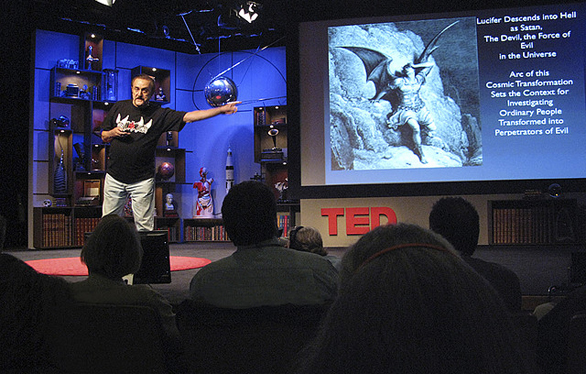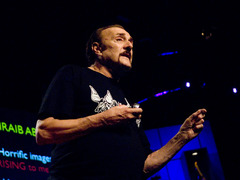 Philip Zimbardo knows evil inside and out.
Philip Zimbardo knows evil inside and out.
 Philip Zimbardo: The psychology of evil
He led the infamous Stanford Prison Experiment of 1971 and was an expert witness at Abu Ghraib, privy to graphic unseen images. At TED2008, Zimbardo explains how easy it is for the good to turn evil, and on the flip side, for inspiration to lead people to heroism.
Philip Zimbardo: The psychology of evil
He led the infamous Stanford Prison Experiment of 1971 and was an expert witness at Abu Ghraib, privy to graphic unseen images. At TED2008, Zimbardo explains how easy it is for the good to turn evil, and on the flip side, for inspiration to lead people to heroism.
Today’s TED Weekends on the Huffington Post features a selection of essays surrounding the ideas brought up in Zimbardo’s talk. Here, three essays to pique your interest.
Philip Zimbardo: Journeying From Evil to Heroism
EVIL: How and why do good people turn evil?
VERSUS
GOOD: How can ordinary people be inspired to act heroically?
These two questions have been challenging me since I was a kid, and finally after many decades, I have discovered answers that I need to share with everyone who might care about these fundamental issues of human nature.
Growing up in poverty in the inner city of the South Bronx, New York City, means that I — like all such kids similarly situated everywhere in the world — was surrounded by evil. There were and are always hustlers, guys who make a living by getting good kids to do bad things for a little money — like steal, run drugs, sell their bodies, and worse. Why did some kids give in and start down that slippery slope of evil, while others resisted and stayed on the right side of that line separating good from evil? Read the full essay »
Marina Nemat: The Many Faces of Evil
In 1977, a 21-year-old political prisoner, Ali Moosavi, was tortured in Evin Prison in Tehran, Iran, by SAVAK, the Shah’s secret police. Ali was a devout follower of Ayatollah Khomeini, whom the vast majority of Iranians — including Marxists, Islamists, liberals, seculars, etc. — came to support during the revolution as the only leader who could unite everyone against the monarchy. Ali was hung from a ceiling in a torture room in Evin. He was beaten for hours and then repeatedly electrocuted. He believed in his cause, which, according to him, had to do with bringing justice and democracy to Iran. To many people, he was a hero.
In 1982, it had been about three years since Iran had become an Islamic republic, but the country was neither free nor democratic. On a daily basis, thousands of young people protested on the streets against the antidemocratic policies of the new regime. Hundreds of protestors were arrested and then tortured in Evin. It was supposed to be shut down with the success of the revolution in 1979, but it wasn’t. In 1980, Ali Moosavi became an interrogator in Evin and tortured teenagers. Read the full essay »
Sam Sommers: Life, Oversimplified
Personality is overrated.
One of our biggest misconceptions about human nature is that the people around us are of consistent, predictable character. When thinking about one another we tend to oversimplify, categorizing each individual as either a good or an evil person, a hero or a coward, and so forth.
But the reality of our social universe is far more nuanced. People are complicated and compellingly contradictory. Human nature is surprisingly context-dependent.
Zimbardo makes this case using graphic visual evidence to show us the darkest capabilities of otherwise ordinary individuals. But our tendency to explain away bad behavior as the result of “a few bad apples” isn’t limited to egregious atrocities. In fact, I rely on the very same principles when speaking to corporations and other organizations about, say, the psychology of fraud and unethical behavior. Read the full essay »
Comments (4)
Pingback: Like Gumbo | Thrill Seeking Behavior
Pingback: THE TIME FACTOR: PHILIP ZIMBARDO | THE PARADIGM GROUP
Pingback: Wizmo Blog » Blog Archive » TED Weekends: Understanding evil